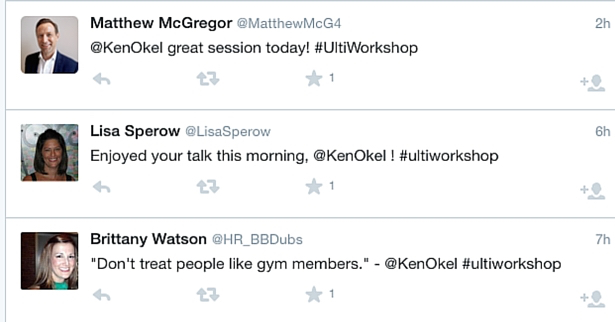 I’m a big fan of the productivity at work study and was excited to see a new one that was from a good source, had a respectable sample size, and made some useful conclusions. The study, Mobility, Performance, and Engagement found that companies that are rated by employees as pioneers in how they support mobile technology, enjoyed a 16% rise in productivity.
I’m a big fan of the productivity at work study and was excited to see a new one that was from a good source, had a respectable sample size, and made some useful conclusions. The study, Mobility, Performance, and Engagement found that companies that are rated by employees as pioneers in how they support mobile technology, enjoyed a 16% rise in productivity.
The study, from the Economist Intelligence Unit, further found that being able to work remotely resulted in a 16% boost in creativity, a 23% jump in satisfaction, and a 21% increase in loyalty. All of this was when you compared them to companies that are poorly rated at supporting mobile technology.
The ability to work remotely is apparently highly valued by today’s workforce, whether it involves working from home, a Starbucks, or a different part of an office. This makes sense as I can appreciate how people value having the tools of their desk at their fingertips.
What the study didn’t consider is one of the biggest productivity at work benefits of mobile technology. That’s the ability to remove yourself from a work environment that is increasingly filled with distractions.
Ever try to get work done and find yourself constantly having to answer questions from your team? It’s not that they are bad people but they may not understand your workload. You may have earned a challenging reputation as the person who “knows everything.”
Sometimes you’re trying to complete an important task while two colleagues are outside your door, recapping last night’s game. Again, they’re not evil but clueless when it comes to your job.
And there are those times when an otherwise valued employee will burst into your office and ask you to solve a toilet paper surplus, while you’re tying to make sure that everyone gets paid during financially challenging times.
The nice thing about mobile working is that you can get away from these distractions. The challenge is that not all of us have this luxury. So what can you do to protect your productive time? Here are a few easy tips that can act as a good starting point:
Close the Door
It’s a simple solution that most of us overlook. Many equate closing a door to either a sign of anger or anti-social behavior. Why not think about it as way to maximize your time, especially if you don’t do it all the time. Then people will learn that a closed door means that they should stay away.
Have Office Hours
University professors control distractions by allowing students to visit them only during certain times. The rest of the day, the professor can focus on other goals, like publishing or research. Set up office hours to give you some uninterrupted time.
Unplug
It’s funny that while I celebrate the ability to work through mobile technology, sometimes the best thing is to pretend that you’re working in the 1980s. Do you have to respond to emails the second they come in? Maybe, you can disable the email alert feature and periodically check and respond to your messages.
Bottom Line: Technology can make us more productive but sometimes the best way to get more time is not about a magic button but rather the ability to make controllable distractions disappear. Keep this in mind before you’re featured in the next productivity at work study.







